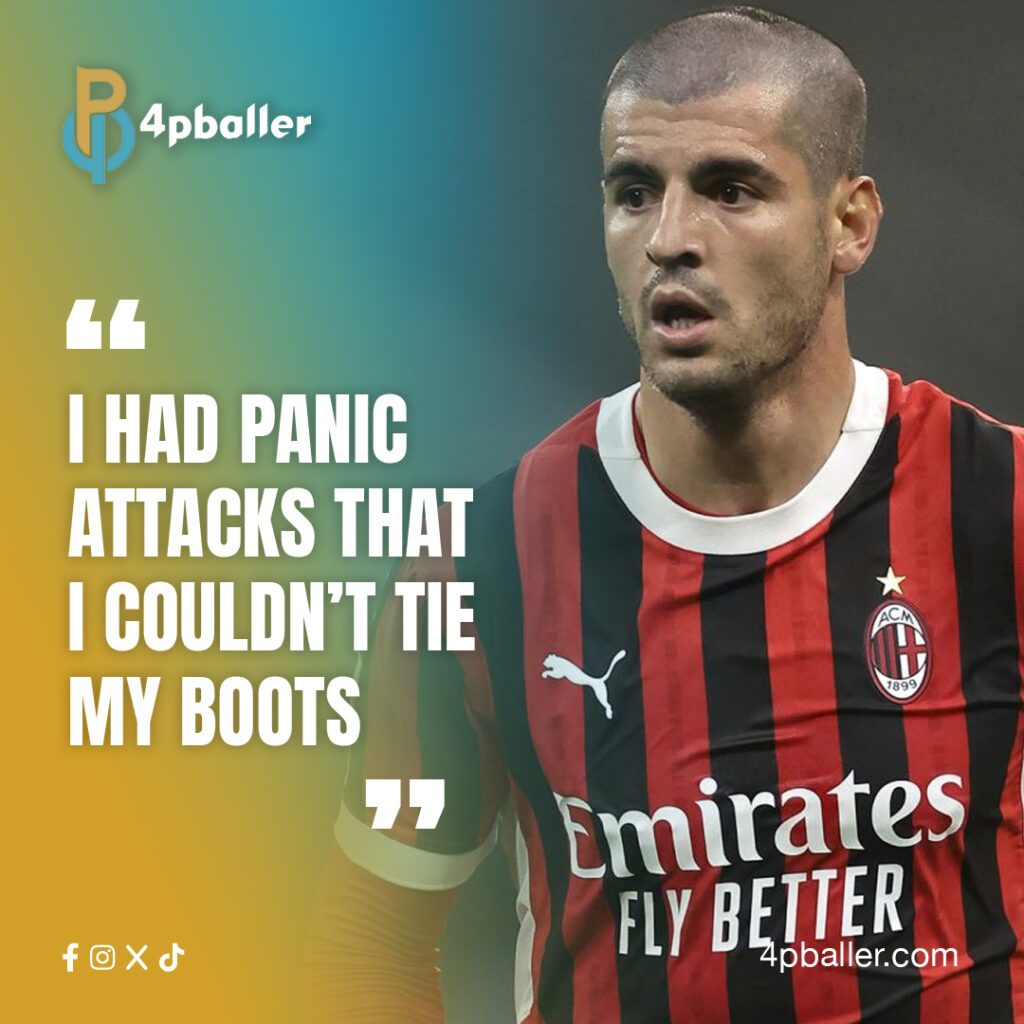I had panic attacks that I Couldn’t Tie My Boots
The pristine grass of international football stadiums and the roar of thousands of fans often mask a silent struggle that many athletes face behind closed doors. Spanish national team captain Álvaro Morata’s recent disclosure about his battle with depression and panic attacks has torn open the curtain on a reality that the sporting world is only beginning to address openly: the mental health crisis in professional athletics.
The Weight of the Armband
Morata, whose career has spanned some of football’s most prestigious clubs including Real Madrid, Chelsea, and Juventus, recently revealed that his mental health struggles nearly prevented his participation in Euro 2024. For a player who has scored crucial goals in Champions League finals and led his national team in major tournaments, the admission showcases how mental health challenges can affect anyone, regardless of their achievements or status.
“When you go through really tough times, depression, panic attacks, it doesn’t matter what job you do or the situation you’re in. There’s another person inside you that you have to fight against every day and every night. For me, leaving Spain was the best option; I couldn’t handle it.”
“The pressure became unbearable,” Morata shared, describing moments when panic attacks would strike without warning, even as he prepared for matches. These revelations mirror findings from a comprehensive study published in the British Journal of Sports Medicine, which found that elite athletes face unique psychological stressors that can significantly impact their mental well-being.
 The Price of Fame
The Price of Fame
The modern athlete faces unprecedented scrutiny. Social media platforms have eliminated the buffer between players and fans, creating an environment where criticism can be instant, constant, and brutal. Morata’s decision to leave Spain for Italy wasn’t merely a career move but a vital step toward preserving his mental health.
“I went through a very bad time. I thought I wouldn’t be able to put on my boots and step onto the field again. But thanks to many people, from Simeone, Koke, Miguel Ángel Gil (Atleti CEO) last year, my psychiatrist, my coach… we are what you see on TV and on social media, but often that’s not real. You have to present an image because it’s your job. I went through a really hard time, I broke down, and there came a point where I couldn’t even tie my boots. And when I did, I ran home because my throat would close up, and I’d start seeing things blurry.”
According to sports psychology experts, the combination of public scrutiny, performance pressure, and the physical demands of elite sports creates a perfect storm for mental health issues. Dr. Sarah Thompson, a leading sports psychologist, explains: “Athletes often feel trapped in a paradox where showing vulnerability could be perceived as weakness, yet suppressing these feelings can lead to more severe psychological issues.”
The Numbers Tell a Story
The statistics surrounding mental health in professional sports are sobering:
- Approximately 35% of elite athletes suffer from mental health issues
- Depression rates among professional athletes are as high as 25%
- Anxiety disorders affect up to 45% of active professional athletes
- Young athletes (18-25) are particularly vulnerable, with higher rates of mental health challenges than their non-athlete peers
These figures, compiled from various studies and sports medicine journals, paint a picture of a widespread issue that has been historically underreported and undertreated.
Breaking the Silence
Morata’s openness about his struggles follows in the footsteps of other prominent athletes who have helped destigmatize mental health discussions in sports. Naomi Osaka’s withdrawal from the French Open and Michael Phelps’s advocacy for mental health support have created precedents for athletes to prioritize their psychological well-being.
“There was a time when I thought I couldn’t continue,” Morata admitted. “But seeking help changed everything.” His journey from silence to advocacy mirrors a broader shift in how sports culture approaches mental health. The support he received from family, friends, and mental health professionals played a crucial role in his recovery, highlighting the importance of having strong support systems in place.
The Role of Sports Organizations
Morata’s experience has also sparked discussions about the responsibility of sports organizations in supporting athletes’ mental health. Many professional leagues and teams are now implementing comprehensive mental health programs, including:
- Regular psychological assessments
- Access to mental health professionals
- Stress management workshops
- Player support networks
- Media training and coping strategies
The International Olympic Committee has taken significant steps in this direction, publishing comprehensive guidelines for managing athletes’ mental health. These initiatives represent a growing recognition that mental health support should be as readily available as physical therapy and medical treatment.
Cultural Shifts and Masculine Stereotypes
In male-dominated sports like football, traditional notions of masculinity often conflict with open discussions about mental health. Morata’s willingness to share his struggles challenges these stereotypes and provides a model for other male athletes to express vulnerability.
Dr. James Rodriguez, a sports sociologist, notes: “When a prominent male athlete like Morata speaks about mental health, it creates a ripple effect throughout sports culture. It helps dismantle the ‘tough guy’ image that has prevented many athletes from seeking help.”
The Impact of Public Criticism
The relationship between public criticism and athlete mental health deserves particular attention. Studies show that constant negative feedback can lead to:
- Increased anxiety levels
- Decreased performance
- Lower self-esteem
- Higher risk of depression
- Physical symptoms of stress
Morata’s experience of leaving Spain to escape intense scrutiny highlights how environmental factors can significantly impact an athlete’s mental well-being. This raises important questions about fan culture and media responsibility in sports coverage.
The Path Forward
As awareness grows, sports organizations are implementing more comprehensive support systems. These include:
- Preventive Measures:
- Regular mental health screenings
- Stress management training
- Work-life balance support
- Media handling skills
- Support Systems:
- 24/7 counseling services
- Peer support networks
- Family inclusion programs
- Career transition support
- Cultural Changes:
- Destigmatization campaigns
- Mental health education
- Media sensitivity training
- Fan engagement guidelines
Lessons for the Broader Community
Morata’s story resonates beyond the sporting world, offering valuable lessons for society at large:
- Mental health challenges don’t discriminate based on success or status
- Seeking help is a sign of strength, not weakness
- Support systems are crucial for recovery
- Public figures can play a vital role in destigmatizing mental health discussions
- Environmental factors significantly impact mental well-being
The Next Generation
Perhaps the most significant impact of Morata’s disclosure will be on young athletes. By seeing a successful professional athlete openly discuss mental health challenges, aspiring players may feel more comfortable seeking help early in their careers.
Youth sports programs are already beginning to incorporate mental health education and support services, recognizing that early intervention can prevent more severe issues later in life.
Looking Ahead
As we move forward, Morata’s courage in sharing his story contributes to a broader transformation in how sports culture approaches mental health. His experience demonstrates that success and struggle aren’t mutually exclusive and that acknowledging mental health challenges doesn’t diminish one’s achievements or potential.
The conversation around mental health in sports continues to evolve, with more athletes feeling empowered to share their experiences and seek help when needed. This shift represents a fundamental change in how we view strength, resilience, and success in professional sports.
Conclusion
Álvaro Morata’s journey from silent suffering to open advocacy marks an important milestone in sports’ ongoing mental health conversation. His story reminds us that behind every performance statistic and match result, there are human beings dealing with real challenges and emotions.
As we continue to watch our sports heroes perform extraordinary feats on the field, Morata’s narrative serves as a powerful reminder that true strength encompasses both physical prowess and emotional resilience. His courage in speaking out not only helps others facing similar challenges but also contributes to building a more compassionate and understanding sports culture for future generations.
The path forward requires continued commitment from sports organizations, media outlets, and fans to create an environment where athletes feel supported in maintaining both their physical and mental well-being. Only then can we ensure that the beautiful game, and sports in general, truly serves the complete well-being of those who dedicate their lives to it.

